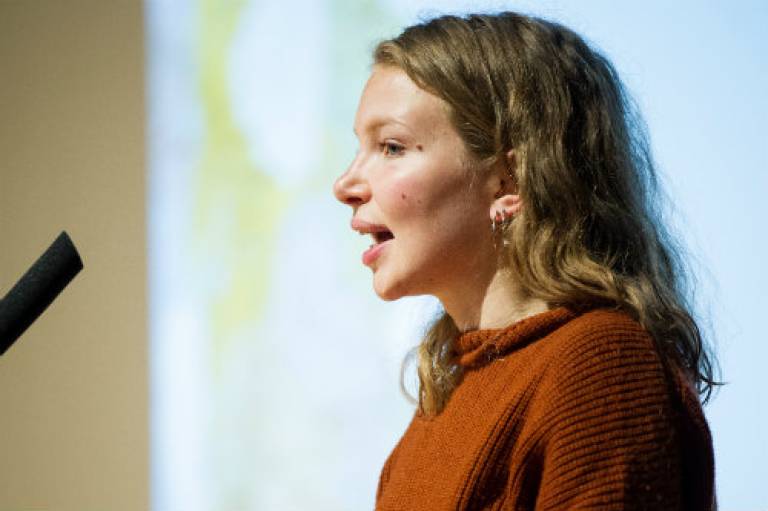UCL's Global Citizenship Programme: "The best two weeks of my degree"
9 June 2016
"It's not the sort of thing I would normally have done.
 I'm not into group work, but it has
changed my outlook and galvanised me into doing something with my career that
will make a positive difference," says Alice Godmon, a third year Human Sciences
student, about UCL's Global Citizenship Programme.
I'm not into group work, but it has
changed my outlook and galvanised me into doing something with my career that
will make a positive difference," says Alice Godmon, a third year Human Sciences
student, about UCL's Global Citizenship Programme.
The programme, a two-week non-credit bearing course that has just finished for this year, is one of the highlights of the UCL calendar.
Alice, 20, was on the Health and Future Cities strand of the programme last year - one of 10 strands students could choose this year. She's now planning to apply for a Master's in Public Health after she graduates and has since become a volunteer with Health Watch England.
The programme gave me a goal
"Before the programme, I wasn't sure what I wanted to do," she says. "I was someone who never had career aspirations or purpose. The programme gave me a goal. For the first time, I felt angry about the problems in the world. It made me want to be involved in positive change and to try to help solve the issues we face. It's just one of those things you have to try."
This year the 900 students who took part in the programme had the opportunity to hear Tarik Jasarevic, spokesman for the World Health Organization, talk about the global response to Ebola and Salim Vally, director of the Centre for Education Rights and Transformation and a visiting professor at the Nelson Mandela Metropolitan University, speak on student activism in South Africa.

But UCL's Global Citizenship Programme is as much about learning through doing as it is about hearing from inspiring speakers.
Those who took part as part of the Enterprise strand worked with social enterprise entrepreneurs to pitch a business idea, while those on the Danube strand examined the historical, cultural, political and social aspects of the countries along the river and learned a Danubian language. The Active Citizenship strand gave students the opportunity to work with Amnesty International, Citizens UK and other campaigners to find a constructive solution to a community problem.
Some elements of the programme were designed to help students with their job applications. As part of the employability strand, students were asked to give a three-minute presentation to a graduate employer on how businesses can be better global citizens. They were then given feedback.
As part of the Health in Future Cities strand, former BBC journalist Rosie Bartlett ran a mock press conference on Polio in which students were told to pretend to be health communications workers or freelance journalists in Lahore, Pakistan.
On the (Un)Urban strand, students were shown how to use "human-centred design" - a creative approach to problem-solving that ensures a building or product suits local people's needs.
Interactive learning
Rattan Sehira, a second-year architecture student who was on this year's programme, says the experience has made him want to get more involved in community and pro-bono architecture.
Ilana Goodkin, a second-year geography student, says she has enjoyed meeting people from different subjects. "You find people have different perspectives as a result of their different disciplines. It's also been much more interactive learning than we are used to, which has been great," she says.
Krzyztof Ignaszak, a third-year Project Management undergraduate, says practising presentation skills in front of employers has given him confidence and "will mean I'm less stressed when it comes to job interviews".
Toby Skailes, who did the programme last year, says it helped him get a place on a graduate scheme. "I had an hour-long interview where I was asked to give an example of one project I had taken part in and I was grilled on it for the whole time. I used Global Citizenship and it really made me realise how many transferrable skills I had gained be that writing a business plan, team work or presentation skills.
"I can genuinely say my two weeks on the programme last summer were two of the best during my three years at UCL," he says.
Find out more by visiting the Global Citizenship Programme website. The programme will run between the 30th May and the 9th of June in 2017. Registration will open in mid-February 2017. There are options for undergraduates and postgraduate taught students. Everyone, no matter what they are studying, is eligible.
Image
- Alice Godmon, a third year Human Sciences student, shares her experiences on about UCL's Global Citizenship Programme. Credit: Kirsten Holst.
Jess Shepherd, The Office of the Vice-Provost (Education & Student Affairs)
 Close
Close

